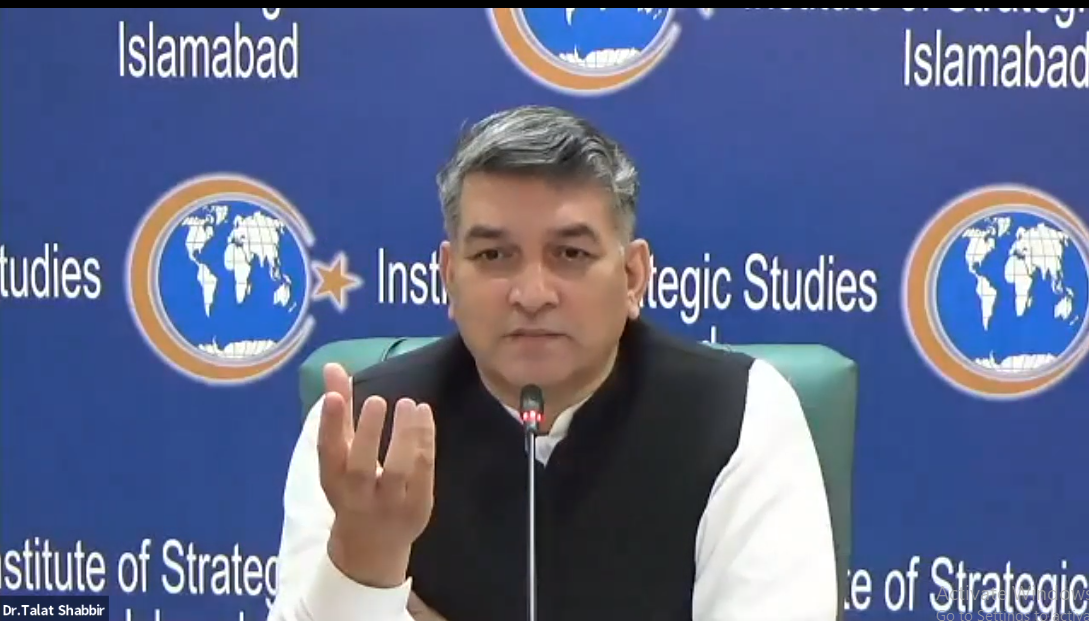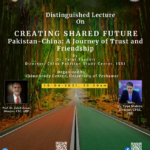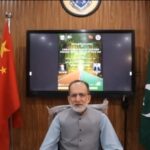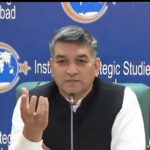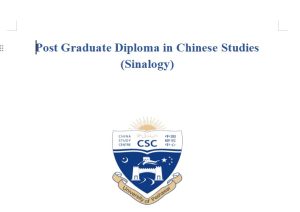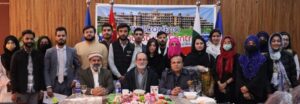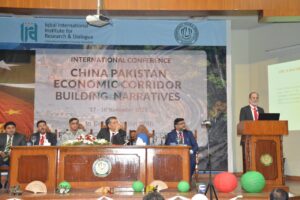SPEAKER: Dr. Talat Shabbir, Director China Pakistan Study Centre, Institute of Strategic Studies Islamabad
China Study Center, University of Peshawar invited Dr. Talat Shabbir a well-known scholar on China to deliver a lecture to students, faculty, research scholars and a large number of viewers from different strata of society. The topic of the distinguished lecture was “CREATING SHARED FUTURES, PAKISTAN-CHINA: A JOURNEY OF TRUST AND FRIENDSHIP.” Pakistan China relations: A journey to a shared future.” Prof Dr. Zahid Anwar, Director, China Study Center, University of Peshawar welcomed the distinguished Speaker and other honorable participants.
About the Speaker:
Dr. Talat Shabbir did Ph.D. in International Relations from Quaid e Azam University Islamabad, MPhil in International Relations from the University of Karachi, MA in International Relations from Balochistan University and, MA in Political Science from University of Punjab. His research interests are Pakistan- China relations, Belt and Road Initiative (BRI), China Pakistan Economic Corridor (CPEC). He was a visiting scholar at George Washington University USA, and He is a faculty member of the Institute of Strategic Studies Research and Analysis (ISSRA), National Defense University besides, he is an editor of PIVOT, a magazine from the Institute of strategic studies. Dr. Talat Shabbir is a regular contributor to National newspapers and many TV channels. Dr. Talat Shabbir is the author of the book “Creating Shared Futures, Pakistan-China: A Journey of Trust and Friendship”. Currently, he is working as a Director China Pakistan Study Centre at Institute of strategic studies Islamabad. Dr. Talat Shabbir is a prolific writer and poet and has published several books.
Distinguished Lecture
The lecture was formally started with the Recitation of the Holy Quran. Dr. Talat Shabbir thanked Professor Dr. Zahid Anwar for inviting him to the online lecture. In his lecture he stated that China’s history is very old, and it is an ancient civilization. Pakistan also has a rich history and an ancient civilization. Pakistan and China Relations formally started in 1949. Pakistan and China have different ideology, culture, and language yet both have a strong relationship. There is a measure of reliability that brings the two countries close. Pakistan has been in collaboration with China since the beginning of their diplomatic ties in the 1950s.
China and Pakistan begin to interact with each other in an interesting time, it was the time when the Second World War was over and people in the world were grappling with various economic disasters. Alliances were made by the countries, namely East and West block. West was headed by the United State of America and East was led by the Soviet Union. After the World War, many events shaped the policies and behavior of Pakistan. The series of developments which strengthened Pakistan China Relations were Deng Xiaoping Reforms after 1978, the disintegration of the Soviet Union in 1991 and the catastrophe of 9/11. These events impacted Pakistan China relationship profoundly.
From 1949 to the 1960s several important events and challenges shaped the policies of China and Pakistan. In Pakistan 1965 and 1971 wars against India, Soviet invasion of Afghanistan in 1979, and Pakistan role to combat Soviet Occupation of Afghanistan, 9/11 and the global war against terrorism deeply embedded Pakistan. Similarly in 1949 Chinese Communist Party (CPC) took over China then there was a Great Leap Forward, Cultural Revolution, 1978 reforms and Soviet invasion of Afghanistan, and China’s economic rise in 1978 these events shaped China’s economy and behavior. The border dispute between India and China was responsible for setting a base for strong friendship between Pakistan and China. After the Pakistan-India war in 1971, China made efforts to take its relationship with Pakistan to next level by building strategic and economic infrastructure in Pakistan, which was the indication of a long-lasting camaraderie and partnership between the two countries. The events of 9/11 in the USA have impacted the global order and alliance system nevertheless in this tough time Pakistan and China remained close to one another. When the Soviet Union was disintegrated China begins to speed up its development and began to expand its political and economic influences around the globe. It was a very important time for China to initiate policies that put China, where it is today. If we talk about regional politics India was one of the threats to China and Pakistan relations. The containment of India’s aggressive behavior and expansionist policies were one of the priorities of China and Pakistan policy.
Today Belt and Road Initiative BRI is the Biggest largest ambitious move by China which engaged 3/4th of the world’s economies and its ambitious Belt and Road is a nostalgic Silk route revival and China would wish to go ahead with all its resources and vigor. Today for China the most important is the regional events and for China, India, Afghanistan, and Iran are important countries. Because of these countries’ China can expand its impact. The withdrawal of the US and its allies from Afghanistan will give way to China to spend in the advancement of Afghanistan. Peace in Afghanistan is essential for China as it can increase its control on Central Asia through Afghanistan. We have examined China’s neutral Policy in Afghanistan after 9/11. Due to its nonintervention and impartial strategy, many Afghan fictions have a good relationship with China. China’s behavior to a great extent is rational and very calculated. China always tried to avoid confrontational strategies.
After the 9/11 incident, the shift of policies and emergence of new world order happened. Today we can see multi-polarity around the world. And most of the countries are trying to influence global politics. Multi-polarity is good for Pakistan because Pakistan will have the option to engage with many countries.
He further added that China-US trade war has a bad impact on the developing countries and it also badly effects the relations between the two big powers. In the competition between China and the US, China will prevail due to its shrewd approaches and patience. BRI and CPEC have the potential to bringing peace to the region. Talat Shabbir was of the view that BRI and CPEC can turn out to be a reason for integrating a region. Today the West is thinking about introducing a plan like BRI so that they can capitalize and enlarge its authority in the globe. For developing countries that will have a virtuous effect because that engagement opportunity with several countries will increase and it will bring peace.
Pakistan and China have strong defense, strategic economic relations. Today Pakistan has all-inclusive all-encompassing relations with China. Pakistan should learn from Chinese wisdom especially Artificial intelligence, Big Data, Smart Applications, Cloud Computing, Thermal, Drone technology. He emphasized that besides China Pakistan Economic Corridor (CPEC) Pakistan should also pay attention to strengthening with China knowledge corridor, it is high time to focus on extensive exchanges of knowledge, faculty and students exchange. These exchanges will help Pakistan to create a knowledge-based economy.
Today China under its Belt and Road Initiative BRI is investing and expanding its influence around the globe. Around 70 economies around the world have joined the China BRI project. BRI is an economic venture for China. And it will move the world to a shared destiny. China-Pakistan Economic Corridor (CPEC) the flagship project of China’s Belt and Road Initiative (BRI) in solidifying Pakistan-China relations in recent years. CPEC is a Pakistan megaproject, and the Chinese side is investing a huge amount in Pakistan. Dr Talat Shabbir was of the view that Pakistan and China are joining hands to address future challenges to ensure peace and prosperity in the region. Both countries should work hand in glove to tackle post-pandemic challenges.
Conclusion: The speech was followed by question & answer session and the honorable speaker answered different questions related to the diplomatic relations between the two countries. In the end, Prof. Dr. Zahid Anwar, Director China Study Center, University of Peshawar thanked Dr. Talat Shabbir for his time and for highlighting different aspects of Pakistan and China relations and the audience participating in the online lecture in such a large number.

